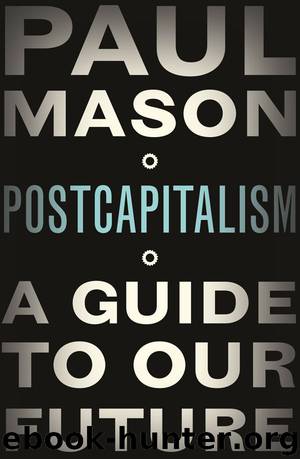PostCapitalism: A Guide to Our Future by Paul Mason

Author:Paul Mason [Mason, Paul]
Language: eng
Format: epub
Tags: MacRoeconomics, Political Freedom, Geopolitics, Economics, General, Political Science, International, Business & Economics
ISBN: 9780141975306
Google: 2yNqCAAAQBAJ
Publisher: Penguin Books Limited
Published: 2015-07-30T21:24:34+00:00
SOME VALID OBJECTIONS …
Here’s why I like the labour theory of value. It treats profit as if it were made somewhere central within capitalism: the workplace, not the marketplace. And it treats one of the most basic things we do every day – work – as if it were important to economics. But there is also a long list of valid objections to the labour-theory:
Q: Why do we need a ‘theory’ at all? Why not just the facts – as in the GDP figures, company accounts, the stock markets, etc.?
A: Because we want to explain change. In science we want to go beyond a neat row of butterflies pinned under glass; we need a theory of why each sub-species looks slightly different. We want to know why, during a million repetitions of their normal lifecycles, small variations can emerge and then, suddenly, massive change.
Theories allow us to describe the reality we can’t see. And they allow us to predict. All forms of economics accept the need for theory. But the difficulty of finding one, and confronting its implications, led economics in the late nineteenth century to retreat from the scientific method.
Q: Why can’t I ‘see’ value, surplus value and labour time? If they don’t show up in the accounts of companies, and professional economists don’t acknowledge them, aren’t they just a mental construct?
A: A more sophisticated way of putting it would be to say, as the Cambridge economist Joan Robinson did in the 1960s, that the labour-theory is ‘metaphysical’ – a mental construct whose existence could never be disproved. For good measure she said the same about ‘utility’ – the key idea in mainstream economics – but accepted that metaphysics was better than nothing.15
Yet the labour-theory is more than metaphysics. Of course it works at a certain level of abstraction: that is, parts of reality are filtered out. For example, it is a model of a pure capitalism, in which everybody works for wages; there are no slaves, peasants, mobsters or beggars. It describes a process that works ‘behind the backs’ of economic agents: nobody can calculate whether they are spending more or less than the necessary labour time – though making a decent guess at it has become crucial to productivity management.
In the labour-theory, the market is the transmission mechanism between this deep, unknowable process and the surface outcome. Only the market can mediate the individual choices into an aggregate effect; only the market can tell us what the socially necessary labour time is. In this sense, the labour-theory is the greatest theory of the market ever written. It ascribes to the market, and only the market, the mechanism of making concrete the reality beneath.
So, yes, it is abstract – but no more abstract than Adam Smith’s concept of the ‘hidden hand’ or Einstein’s general theory of relativity, proposed in 1916 but not proved empirically until the 1960s.
The question remains: is it provable? Would it be possible to challenge the labour-theory in its own terms with evidence? Does it
Download
This site does not store any files on its server. We only index and link to content provided by other sites. Please contact the content providers to delete copyright contents if any and email us, we'll remove relevant links or contents immediately.
| Accounting | Economics |
| Exports & Imports | Foreign Exchange |
| Global Marketing | Globalization |
| Islamic Banking & Finance |
50 Economics Classics by Tom Butler-Bowdon(2571)
Six Billion Shoppers by Porter Erisman(2302)
Why Nations Fail: The Origins of Power, Prosperity, and Poverty by Daron Acemoglu & James Robinson(2297)
No Time to Say Goodbye(2117)
Red Notice by Bill Browder(2082)
Currency Trading For Dummies by Brian Dolan(1929)
The Economist [T6, 22 Thg9 2017] by The Economist(1926)
Thank You for Being Late by Thomas L. Friedman(1770)
Bitcoin: The Ultimate Guide to the World of Bitcoin, Bitcoin Mining, Bitcoin Investing, Blockchain Technology, Cryptocurrency (2nd Edition) by Ikuya Takashima(1699)
Amazon FBA: Amazon FBA Blackbook: Everything You Need To Know to Start Your Amazon Business Empire (Amazon Empire, FBA Mastery) by John Fisher(1575)
Coffee: From Bean to Barista by Robert W. Thurston(1545)
The Future Is Asian by Parag Khanna(1484)
The Great Economists by Linda Yueh(1454)
How Money Got Free: Bitcoin and the Fight for the Future of Finance by Brian Patrick Eha(1425)
Grave New World by Stephen D. King(1421)
Pocket World in Figures 2018 by The Economist(1419)
Capitalism Without Capital: The Rise of the Intangible Economy by Jonathan Haskel(1401)
The Sex Business by Economist(1386)
Cultural Intelligence by David C. Thomas(1289)
